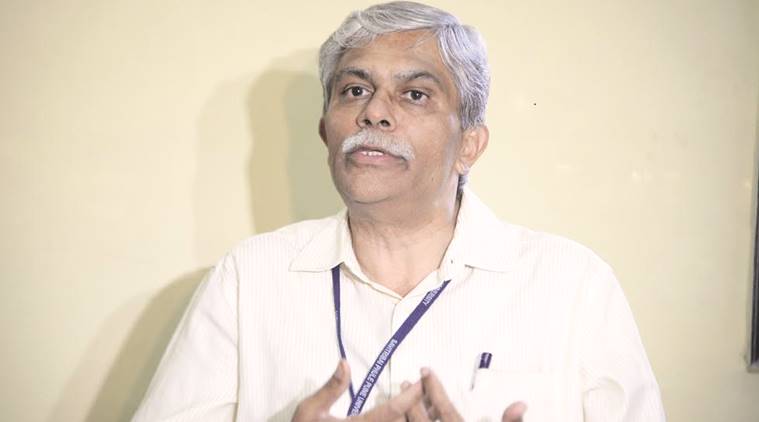 Dr Nitin Karmalkar, SPPU Vice-Chancellor
Dr Nitin Karmalkar, SPPU Vice-Chancellor
Savitribai Phule Pune University (SPPU) is one of 60 educational institutes to have been granted autonomy by the Ministry of Human Resource Development (MHRD). With a NAAC score above 3.51, the university was placed in Category I, the highest grade of autonomy. SPPU Vice-Chancellor Dr Nitin Karmalkar spoke to The Indian Express on what autonomy means, his vision for the future and the university’s chances of being selected as one of the coveted 10 Institutes of Eminence.
What will autonomy mean to the university and its students?
There are a lot of benefits associated with it. Some of it is not even clear right now as it has been just announced. But, from what I have understood, autonomy will free us from approaching the University Grants Commission (UGC) every time we want to start new courses, enter into foreign collaborations, hire full-time foreign faculty, run open distance learning programmes, or start off-campus centres. We will be fully empowered to take these decisions on our own.
You mentioned that you could now start new courses without UGC nod. Are there any plans for new courses?
There is no point in offering the same old outdated syllabus and courses, which are no longer relevant. Hence, we will, of course, look at offering new courses and restructure existing ones to bring them up to date. Even until now, we could formulate our own courses and syllabus, but we had to maintain a 75:25 ratio with regard to the stipulated course structure given by the the UGC, and we even had to maintain the nomenclature. Now, we can give courses names that are more job-oriented or viable. We can decide the syllabus from scratch and have complete freedom. Tomorrow, if any course requires that we keep 75 per cent for practicals and only 25 per cent for theory, we can do that without any restrictions.
There is also the provision of setting up research parks. The SPPU already has one such set-up on campus.
Yes, we do have the Science and Technology Park (STP) on campus. But, currently, we only provide consultancy on projects and problem statements that the industry bring to us, but the industry was never a partner as such with the university. It (STP) runs on a consultancy mode, but very few projects are being initiated here. Through this autonomy, we are now looking at partnerships in all respects, including monetary investment by the industry, which at present they do not do. Our investment is our students, who they are using for their projects, so it needs to be a two-way street.
We need to give it a structure. We aim to offer creative solutions to societal problems like water scarcity, waste disposal and clean drinking water. We can partner with many industries to work on such projects, which will produce solutions for society as an end user. Also, we can create ‘Section 8’ companies, for the products which are developed through these research projects.
What are ‘Section 8’ companies? Is there a precedent with respect to such companies at any Indian university?
The university can do a technology transfer to the industry through Section 8 companies and retain the copyright to the solutions. Even today, we have products that are ready, but cannot be marketed for the only reason that we have no such set-up or collaboration. But now, we can develop the technology, patent it and be the copyright holders. We will tie-up with industry for the production and marketing, and the profits will be shared. IIT-Madras has such a set-up and has established such companies. I am sending a team there to study the structure and prepare a report on how we can do it.
SPPU is also in the running for a spot among the 10 Institutes of Excellence (IoE). Can you tell us what its chances are, and at what stage is the selection process?
Frankly speaking, my hopes are very high now after receiving autonomy. We were fourth in the list of 60 institutes, and hence we think our chances may be better. Currently, the process of whetting and selection is ongoing. I think it could easily take up to two more months before any announcement is made. For a university to be selected as an IoE, it requires a certain commitment from the state government as well. For that, I am making a presentation to the governor on April 8, at a joint meeting of all V-Cs of state universities.
What is the difference between the autonomy received currently and the freedom that comes in after being selected as an IoE?
The biggest advantage of being selected as an IoE is the funding it will bring. Each university is supposed to get Rs 1,000 crore over five years. But, besides that, the benefits are immense. Currently, the university has affiliated colleges because of which we have a Senate, as well as an Academic and Management Council, which provide representation from colleges. However, once the IoE tag comes in, a board of management (BoM), similar to what IITs have, will come in, where all members are from within the campus or consist of academic experts not related to colleges. The university as a campus or sub-campus will be governed by this BoM, and they take decisions on syllabus, new courses, funding and expenditure. And this is just one of the benefits.